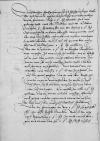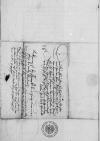Letter #4897
Ioannes DANTISCUS to Albrecht I von Hohenzollern-AnsbachBraunsberg (Braniewo), 1541-06-03
| received Königsberg (Królewiec), 1541-06-04 Manuscript sources:
Auxiliary sources:
Prints:
| ||||||||||
Text & apparatus & commentary Plain text Text & commentary Text & apparatus
Dem durchlauchten, hochgebornen fursten und herren, hern
Durchlauchter, hochgeborner furst, hochgunstiger, lieber her und freundt. / Unsere freuntliche und vleiswillige dinste zuvoran. /
Aus E(wer) F(urstlichen) D(urchlauch)t cf.
Was den ersamen E(wer) F(urstlichen) D(urchlauch)t underthan
Vor die zeitungen, die uns E(wer) F(urstliche) D(urchlauch)t zugeschickt, thu wir uffs hochste dacken, / und so den weg nach  GStA PK, HBA, C1 No 763, 1v mocht sein, / von uns dohin geschrieben wolt haben, / dorzu erbieten wir uns willig, / dan E(wer) F(urstliche) D(urchlauch)t und dem churfurstlichen hause Brandenburg, / wie wir negst gemelt, / freuntlich und nutzlich zudienen, / sein wir superinscribed⌈wirwir superinscribed⌉ erbottig und gevlissen, / Got den almechtigen bittende, / dieselbte E(wer) F(urstliche) D(urchlauch)t zu langen zeiten in guter gesuntheit und aller wolfart zuenthalten. /
GStA PK, HBA, C1 No 763, 1v mocht sein, / von uns dohin geschrieben wolt haben, / dorzu erbieten wir uns willig, / dan E(wer) F(urstliche) D(urchlauch)t und dem churfurstlichen hause Brandenburg, / wie wir negst gemelt, / freuntlich und nutzlich zudienen, / sein wir superinscribed⌈wirwir superinscribed⌉ erbottig und gevlissen, / Got den almechtigen bittende, / dieselbte E(wer) F(urstliche) D(urchlauch)t zu langen zeiten in guter gesuntheit und aller wolfart zuenthalten. /
Dat(um)
ma(n)u p(ro)pria s(ub)s(cripsi)t adscribed, in the hand of Dantiscus⌈ma(n)u p(ro)pria s(ub)s(cripsi)tma(n)u p(ro)pria s(ub)s(cripsi)t adscribed, in the hand of Dantiscus⌉
Postscript:
Nach schliessung dis brieffs / ist uns von



